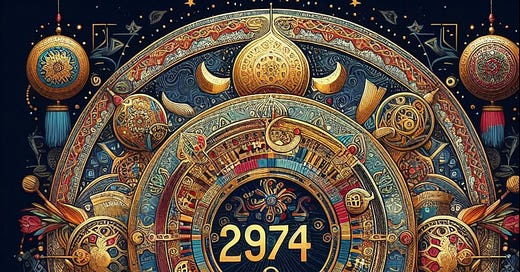Introducing Criticising Criticisms (CritCrit)
... or the (seemingly) infinite chain of contradicting my own judgment
Hereby I give birth to the ugliest, most savage bastard of dialectical reasoning. Behold, CritCrit utters its first cry and is ready to lead us astray into an epistemological wasteland.
So, how does this work? Each CritCrit post begins with a thesis, which I then shamelessly attack with whatever means possible to contradict it. But the fun does not stop there. Unappeased, I criticize the preceding criticism only to blast it again, and again, AND AGAIN. I will keep battering the consequent discontented lines of reasoning until I draw my last breath… or get bored or rushed by more practical matters of the mundane.
Photo: Bing image creator
I planned on kicking off with something bombastic, such as the image of God!… but then it turned out it’s Berber New Year today! Alright, here goes:
Thesis: North Africa is exclusively inhabited by Arabs.
Crit T1 (“T” indicating a reference to the thesis): Negative. North Africa is inhabited by many different ethnicities, including Amazigh peoples who so happen to celebrate New Year on January 13 (some do on January 12). Aseggwas Amaziɣ (ⴰⵙⴳⴳⵯⴰⵙ ⴰⵎⴰⵣⵉⵖ, Arabic: ينّاير) always comes in January, hence its “Yennayer” name. Interestingly enough, it corresponds to the first day of January in the Julian Calendar.
Reminder: we no longer use the Julian Calendar ever since October 1582 when Pope Gregory XIII’s papal bull came into force.
Therefore, the Berber calendar, just like Julian, is shifted thirteen days compared to the Gregorian calendar.
The man responsible for creating the Berber calendar was a Paris-based Algerian scholar by the name of Ammar Negadi. Establishing the calendar in 1980, he indicated 943 BC as the zero year. The annual date is when Shoshenq I initiated the 22nd dynasty of Egypt. Yeah, the Egyptians were ruled by Berbers at some point.
In Morroco, for instance, the Berber New Year has been a day off ever since King Mohammed VI declared it a national public holiday on May 3, 2023.
Crit A1: Everything’s neat and clean but why commit the blatant blunder of using the hateful “Berber” adjective? Not only it is not of Amazigh origin but it also denotes “a barbarian” or “barbarous” when used as an adjective.
How did it ever end up in the same phrase in the first place? If you wish your friend Rashid from Midelt a happy New Berber Year what you’re actually saying is “Happy New Barbarous Year” or “Happy Year, you barbarian”! How does it make for a kind New Year wish, you nitwit?
Instead, you should be saying “Happy New Amazigh Year”, if not “Asgas ambarki”, meaning “a Blessed New Year”.
Crit A1→B1: Oh, alright Mrs. Grundy. If you want to be all proper, you should now differentiate between different Amazigh groups and use the correct denominative addressing a representative of each Ber-… Amazigh group.
If one were to follow your prude mindset, one should also first ask an Amazigh person to be more specific about their origin. In other words, are they Irifiyen, Icenwiyen, Icawiyen, Imazighen, Ichelhiyen, Igwanciyen, Iqvayliyen, Igwrarinen, Iggwertiyen, Imzaviyen, Iwarcilen, Ikroumiyen, Ifren, Ilwaten, Inefzawen, Ijerbiyen, Infussen, Ilwaten, Iwgilen, Isiwan, Igafsen, Itargiyen or Izenagen.
Crit A1→B1→A2: Hold up, I’m getting a headache. Can’t I just wish them “Asgas ambarki”?
Crit A1→B1→A2→B2: But why would you wish anybody a Blessed New Year? Would you suggest that the elapsing year was not blessed at all?
Crit A1→B1→A2→B2→A3: I would not focus too much on the “blessed” part. It’s merely conventional to do so.
Crit A1→B1→A2→B2→A3→B3: For you perhaps but is it for them?
=TERMINATION=
I’ve gotta run. Ta-ta for now!





